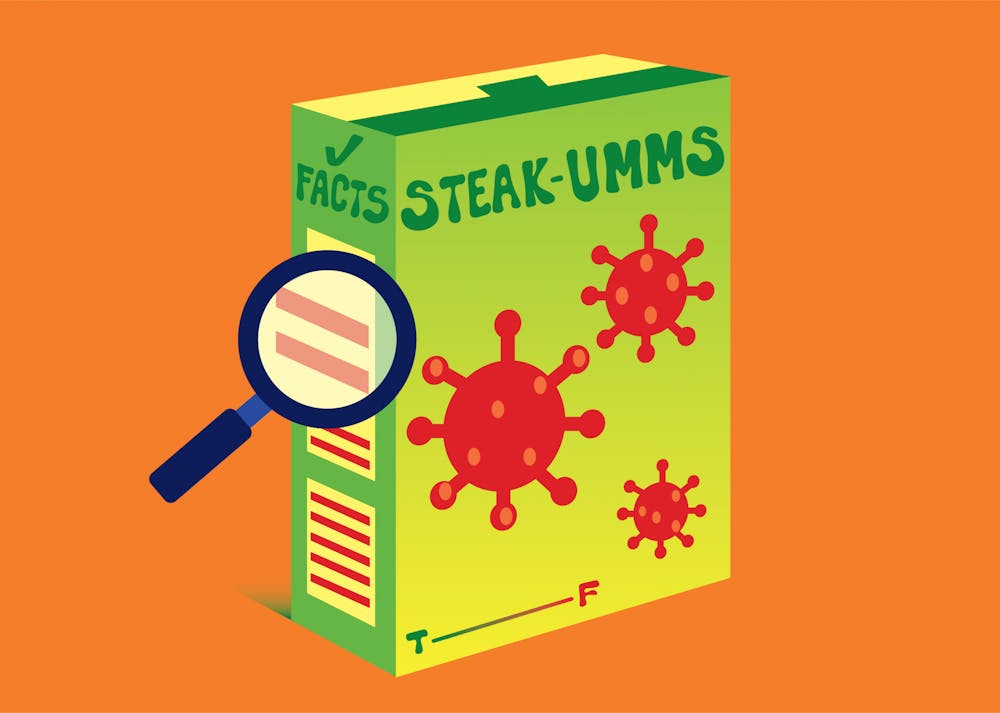"Frozen Meat Against COVID-19" sounds more like a timely, satirical action movie than the title of a research paper.
A recent case study from two researchers at ASU and North Carolina State University analyzed an unlikely science communication campaign from the Steak-umm brand Twitter account.
Steak-umm, a brand that sells frozen, thin-sliced sandwich steaks, began posting Twitter threads this April that urged its followers to be wary of COVID-19 misinformation and mindful about where they get their news.
The posts, which Steak-umm described as "peak irony," received widespread attention with tens of thousands of retweets and likes. The brand's post was even promoted by Columbia University's Department of Surgery's account and was referred to by the Wall Street Journal as a "coronavirus misinformation watchdog."
The study analyzed replies to the Tweets searching for patterns and found four main themes: praise, surprise, leadership and product mentions.
Ekaterina Bogomoletc, a Ph.D. student at NC State focusing on strategic and science communication, was intrigued by the popularity of Steak-umm's posts. When she found a call for research papers about businesses' reactions to COVID-19, she thought this campaign would be a perfect fit.
Bogomoletc reached out her former instructor Nicole Lee, who recently came to ASU's School of Social and Behavioral Sciences as an assistant professor, for assistance on the project. Lee suggested they use the expectancy violations theory, which argues that sometimes violating, instead of confirming, public expectations can be positive.
"We have these expectations for how brands or individuals are going to communicate in a given situation, so when a brand violates those expectations, we pay attention to it, we notice it and then assess if it's positive or negative," Lee said. "The whole thing was about it being surprising, really."
This campaign isn't the first time Steak-umm maintained an uncharacteristic social media presence. In 2017, the brand went viral in its crusade to be verified on Twitter.
Though the recent campaign is more serious than their previous activity, it's in line with the social media strategy planned by a team at Allebach Communications, a food marketing company hired by Steak-umm.
Jesse Bender, an account director for Allebach, said building a community on social media and breaking away from norms has a positive result.
"Our goal is to get our brand out there, getting brand new people to our audience," Bender said. "We just take a number of different tactics that are maybe somewhat nontraditional, but we'll take a shot at something."
Bender said the account's following ballooned in the month after their first thread about misinformation. Bogomoletc and Lee found many of the replies mentioned wanting to try Steak-umm or having nostalgic emotions toward the product.
Steak-umm's strategy is part of a broader trend of brands attempting to ingratiate themselves with their customers through authentic or comical social media presences. Brands have staged Twitter feuds, transformed into meme accounts and gone as far as staging the death of a mascot in bids to attract a larger audience.
The trend has even been reflected in pop culture with the anthropomorphization of brands by TikTok users.
Bogomoletc said although there's a lot of existing research in both science communication and strategic communication, the intersection of the two produces especially interesting results.
"We see how we can communicate science, not only to inform people but actually engage people or to achieve some sort of social engagement in science," Bogomoletc said.
Bogomoletc said scientists need more effective ways to educate the public, and this research can help. She said scientists once believed simply presenting facts would be enough to make people believe in science, "but today we see that this is not the case."
"There is so much information, it is so hard for people to navigate it, and we see that the most unexpected actors get involved into this process such as, well, a brand of frozen meat," Bogomoletc said. "I guess it's just really hard for people to decide what they can trust, so it produces a lot of interesting phenomena such as this one."
Reach the reporter at gmlieber@asu.edu and follow @G_Mira_ on Twitter.
Like The State Press on Facebook and follow @statepress on Twitter.




